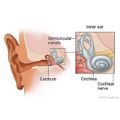Our Health Library information does not replace the advice of a doctor. Please be advised that this information is made available to assist our patients to learn more about their health. Our providers may not see and/or treat all topics found herein.
Topic Contents
Age-Related Hearing Loss
Condition Basics
What is age-related hearing loss?
Age-related hearing loss (presbycusis) is a progressive loss of the ability to hear that happens as people get older. It affects both ears. It starts with problems hearing high-pitched sounds. Over time, the ability to hear lower-pitched sounds may be affected as well. This kind of hearing loss affects most older adults to some degree.
The most frequent cause of age-related hearing loss is the natural breakdown of hair cells in the inner ear. Sound reaches the inner ear, but the breakdown of hair cells prevents proper hearing. This is known as sensorineural hearing loss.
Age-related hearing loss can also be caused by age-related changes that may affect the eardrum or the bones of the middle ear, which affects how well sound can move into the inner ear. Long-term medical conditions, such as high blood pressure, heart disease, or diabetes, or other problems with blood movement (circulation) may also contribute to age-related hearing loss.
What are the symptoms?
Age-related hearing loss usually affects both ears and may range from mild to severe. It may affect your hearing in the following ways:
- Speech sounds mumbled, and conversations are hard to understand, especially when there is background noise.
- Your ability to hear and distinguish high-pitched sounds is reduced. A lower-pitched voice may be easier to understand than a higher-pitched voice.
- You hear ringing, roaring, hissing, or other sounds in your ears (tinnitus). Tinnitus may increase as your hearing loss gets worse.
If you have age-related hearing loss, you may not know it, because older people usually lose their hearing very slowly. Your family members or friends may be the first to realize that you cannot hear well. Without knowing it, you may make small changes over time—turning up the TV volume, standing closer to a person who is speaking—that allow you to adapt to hearing loss. At some point, the loss may become so severe that these changes no longer work.
How is it diagnosed?
Your doctor will do a physical exam and ask about your symptoms and past health. Your doctor may look in your ears with a lighted device. Hearing tests may be done to check if you have hearing loss and how severe it is. You may be referred to an audiologist for the tests.
How is age-related hearing loss treated?
There is no known way to reverse age-related hearing loss. But if you have age-related hearing loss, there are devices that can help you hear and communicate more easily. These include hearing aids, telephone amplifiers, pagers, smart phones, and tablets.
It may be helpful to ask your family and friends to make adjustments when talking with you, such as speaking clearly and facing you so that you can better see their facial expressions and gestures.
How can you care for yourself?
Avoid loud noises or wear hearing protection around them. Wear your hearing aids as directed. Telephone amplifiers, close captioning on videos and TV, email, and text messaging can help. Speechreading may also help. With this method, you pay attention to people's gestures, expressions, posture, and tone of voice to help you understand them.
Related Information
Credits
Current as of: October 27, 2024
Author: Ignite Healthwise, LLC Staff
Clinical Review Board
All Ignite Healthwise, LLC education is reviewed by a team that includes physicians, nurses, advanced practitioners, registered dieticians, and other healthcare professionals.
Current as of: October 27, 2024
Author: Ignite Healthwise, LLC Staff
Clinical Review Board
All Ignite Healthwise, LLC education is reviewed by a team that includes physicians, nurses, advanced practitioners, registered dieticians, and other healthcare professionals.
This information does not replace the advice of a doctor. Ignite Healthwise, LLC disclaims any warranty or liability for your use of this information. Your use of this information means that you agree to the Terms of Use and Privacy Policy. Learn how we develop our content.
To learn more about Ignite Healthwise, LLC, visit webmdignite.com.
© 2024-2025 Ignite Healthwise, LLC.




